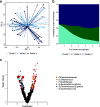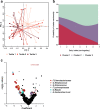Maternal diet during pregnancy is related with the infant stool microbiome in a delivery mode-dependent manner
- PMID: 29973274
- PMCID: PMC6033232
- DOI: 10.1186/s40168-018-0490-8
Maternal diet during pregnancy is related with the infant stool microbiome in a delivery mode-dependent manner
Abstract
Background: The gut microbiome has an important role in infant health and immune development and may be affected by early-life exposures. Maternal diet may influence the infant gut microbiome through vertical transfer of maternal microbes to infants during vaginal delivery and breastfeeding. We aimed to examine the association of maternal diet during pregnancy with the infant gut microbiome 6 weeks post-delivery in mother-infant dyads enrolled in the New Hampshire Birth Cohort Study. Infant stool samples were collected from 145 infants, and maternal prenatal diet was assessed using a food frequency questionnaire. We used targeted sequencing of the 16S rRNA V4-V5 hypervariable region to characterize infant gut microbiota. To account for differences in baseline and trajectories of infant gut microbial profiles, we stratified analyses by delivery mode.
Results: We identified three infant gut microbiome clusters, characterized by increased abundance of Bifidobacterium, Streptococcus and Clostridium, and Bacteroides, respectively, overall and in the vaginally delivered infant stratum. In the analyses stratified to infants born vaginally and adjusted for other potential confounders, maternal fruit intake was associated with infant gut microbial community structure (PERMANOVA, p < 0.05). In multinomial logistic regression analyses, increased fruit intake was associated with an increased odds of belonging to the high Streptococcus/Clostridium group among infants born vaginally (OR (95% CI) = 2.73 (1.36, 5.46)). In infants delivered by Cesarean section, we identified three clusters that differed slightly from vaginally delivered infants, which were characterized by a high abundance of Bifidobacterium, high Clostridium and low Streptococcus and Ruminococcus genera, and high abundance of the family Enterobacteriaceae. Maternal dairy intake was associated with an increased odds of infants belonging to the high Clostridium cluster in infants born by Cesarean section (OR (95% CI) = 2.36 (1.05, 5.30)). Linear models suggested additional associations between maternal diet and infant intestinal microbes in both delivery mode strata.
Conclusions: Our data indicate that maternal diet influences the infant gut microbiome and that these effects differ by delivery mode.
Keywords: 16S rRNA gene; Delivery mode; Fruit; Infant gut microbiome; Infant gut microbiome clusters; Maternal prenatal diet.
Conflict of interest statement
Ethics approval and consent to participate
The Center for the Protection of Human Subjects at Dartmouth provided institutional review board approval. All methods were carried out in accordance with the guidelines. Written informed consent was obtained for participation from all subjects for themselves and their children.
Competing interests
The authors declare that they have no competing interests.
Publisher’s Note
Springer Nature remains neutral with regard to jurisdictional claims in published maps and institutional affiliations.
Figures


References
-
- Chatzi L, Garcia R, Roumeliotaki T, Basterrechea M, Begiristain H, Iniguez C, Vioque J, Kogevinas M, Sunyer J, group Is, group Rs: Mediterranean diet adherence during pregnancy and risk of wheeze and eczema in the first year of life: INMA (Spain) and RHEA (Greece) mother-child cohort studies. Br J Nutr 2013, 110:2058–2068. - PubMed
-
- Duncan SH, Belenguer A, Holtrop G, Johnstone AM, Flint HJ, Lobley GE. Reduced dietary intake of carbohydrates by obese subjects results in decreased concentrations of butyrate and butyrate-producing bacteria in feces. Appl Environ Microbiol. 2007;73:1073–1078. doi: 10.1128/AEM.02340-06. - DOI - PMC - PubMed
Publication types
MeSH terms
Substances
Grants and funding
LinkOut - more resources
Full Text Sources
Other Literature Sources
Medical

